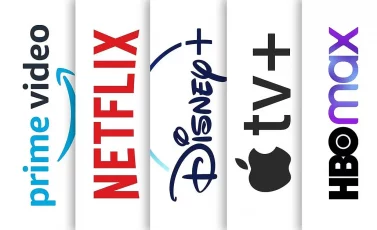The internet became a mainstream tool in the 90s. Since then, it’s disrupted many global industries introducing new possibilities for doing old things. For example, email was the internet’s first killer app, thus removing much friction and costs from worldwide communications.
Since then, the internet has kept evolving and moving forward. Today it’s available on every mobile device in the market at high speeds that were impossible only a few years ago. As a result, more and more activities have been affected by the internet’s evolution.
That brings us to entertainment.
Commercial internet speeds kept increasing, so they became suitable for high-definition video streams. Thus, it became unavoidable that the film and TV industries would have to find ways to accommodate the demand for their product through the internet.
And then, the Covid-19 global pandemic came to the world. As people all over the planet found themselves locked at home, the demand for internet video exploded. If the online video streaming industry was in the making, the pandemic gave it steroids.
Some estimations put at six out of every ten the number of users in the younger demographic whose main internet activity is streaming movies and TV shows. It’s a global trend, and it’s easy to understand. In many cases, watching films and TV shows on your tablet, phone or computer is convenient, easy, and free of charge.
And convenience is the game’s name in many of the new relative ways of doing old things the internet has given us. Unfortunately, however, convenience comes at a price. More often than not, convenience and security conflict with each other, and you cannot have much of both at the same time, unfortunately. Video streaming is no exception to this, especially when it comes to free video websites and apps.
And if young users love all the content they can get from video streaming websites and services. But, unfortunately, hackers enjoy those things every bit as much. So these virtual places are great options for them to apply their craft to steal personal information. Think about the user database of any popular video streaming service. It includes millions of avid users’ names, emails, and payment details. It is no theoretical scenario either. Disney+ had a security breach only hours after its launch. It left thousands of users vulnerable.
So, as happens with every new technology that becomes popular in the mainstream, the new horizons it opens for users bring along new security challenges that are not so visible at the beginning. Nevertheless, they are there.
Cybersecurity and video streaming
The video streaming market is particular in that it has legal and illegal branches. Many of the world’s most popular video sites are free of charge. It is possible because the content they provide is pirated, and they don’t honor distribution agreements with copyright owners. The advantage for users doesn’t stop with the cost but availability, as these platforms can offer the same broad catalog everywhere.
On the other hand, you have legal video streaming services such as Netflix. Doing business legally means they have to negotiate distribution agreements with the copyright owner of every title they have on the catalog.
The deal with each includes things such as the price they will pay for showing it and the countries in which they will have the right to show it. Unfortunately, those things result in inconvenience for their clients. First, they have to pay for the service. Second, they can only see the video platform’s content in their country. So the content library that every platform shows varies with every territory, sometimes wildly. This issue is easy to bypass if you have a premium VPN service, but that’s another story. However, there is one thing that legal streaming websites give to their users, and only a few stop to think about and appreciate it: security.
Watching video streams online comes with risks. But as happens with every popular trend, users are only aware once it’s too late. After that, it’s more or less normal. Security is often the last consideration in a user’s mind when entertainment is the priority. However, awareness is the first step in solving digital security problems, so let’s quickly look at the main security threats you face when watching online streams.
Identity theft
While many free streaming sites need no registration, some of them do. Here comes the first problem. Most users try to have the same username for every account and the same email address; the worst thing is that they will repeat the same password. According to Google, about seven out of every ten users will recycle the same password over several or all their digital accounts. It is a recipe for disaster.
Here we meet our convenience vs security conflict again. Having a single password to unlock every account is convenient. You only memorize one password. You don’t even need to think about which account you’re trying to access, but you can type in the duplicate keys you use in every case and get the job done. But this exceedingly convenient strategy is the worst security nightmare too.
Take a moment to think about what happens if only one of your accounts gets hacked. If that password opens the locks to all your internet doors, the hacker can suddenly gain access to all of them with a single successful attack. Then, they will be able to collect enough information about you to steal your identity and sell it to other criminals.
Malware
Many free video streaming websites are notorious for spreading malware and adware.
The malicious code that can infect a user’s system can give hackers access to internal information and even complete control over a system when the infection is advanced enough.
Phishing
Phishing refers to a family of scams attempting to squeeze users’ sensitive information by imitating legitimate organizations or websites. It can happen through SMS messages, phone calls, emails, and websites.
Inappropriate content
Free video streaming websites often include porn ads unsuitable for younger users.
Other threats associated with video streaming
When you are watching video streams, even legal ones, you need to be aware of the following potential threats:
- Links. Many legal streaming websites allow user comments on their videos. Here you can often find links to infected websites.
- The adware that leads to malware. Free streaming websites are often fraught with ads. Some of them are too annoying, but there are other problems. Both sporting and movie websites often feature far from innocent ads because they are the means through which adware reaches your system. And that is only the beginning because that adware will, in turn, become an open door that will let more destructive code into your devices.
- Popups on legal websites. Here’s the thing about legal video streaming services: they don’t have ads, and they don’t force pop-ups on their users. So if your Netflix is popping up stuff on you, you already have a security problem you must fix as soon as possible.
So what can I do to stay safe while streaming videos online?
The internet brings us so much joy and convenience that it’s hard to believe that it’s a hostile environment that is utterly unsafe for every user.
And video streaming websites are among the worst websites when it comes to privacy, security, and anonymity.
So are we supposed to quit the web? Or never to see a movie online again? Of course not. But we need to adopt a few preventive measures to avoid malware and other threats while streaming.
Keep reading as we tell you the most effective measures you can take to ensure your safety. In contrast, you keep enjoying your favorite movies and TV shows on the internet, even from the most dangerous free video streaming websites and apps.
Nine ways to avoid malware while you stream videos online
1. Stick to legal video streaming services
There are plenty of legal streaming platforms on the internet for your enjoyment. Netflix, Amazon Prime, NOW TV, HBO Go, Disney+, and more have plenty of great content. But, yes, they have disadvantages. You have to pay for them, for a start. Moreover, their content varies from country to country, so even your monthly fee could leave you without the show or movie you wanted.
However, the advantage they give you regarding security is enormous, and no free streaming websites can match it. Therefore, there is no significant risk for you (except if the website is hacked), and there is no price for peace of mind.
And regarding the catalog’s depth limitations due to geographic restrictions, you can get around them easily. Any top-notch VPN service will give you an IP address from the country where your video service offers the most extensive catalog, thus allowing you to see it. So the solution is straightforward. Also, adopting a VPN should be on your radar for security reasons alone (more on that later). So if it also unblocks your Netflix US catalog, you’re killing two birds with a single throw.
2. Beware of untrusted platforms
You should never give your personal data to a suspicious website. Unfortunately, this is a frequent scenario in many sporting and movie-free streaming websites requiring you to register before using their content.
If you must open an account on a fishy website, use a disposable email address, but never give away sensitive information to websites that do not merit it. Having free movies can be a lot of fun, but it’s not a critical task, so do not take unnecessary risks for that reason.
3. Beware of suspicious links
Disguised images, ads, and hyperlinks are among cybercriminals’ favorite ways to spread malware. So please don’t do a hacker’s job for them. Instead, be careful about the links you follow.
4. Use password protection
Always use strong passwords. And adopt safe password policies, like having a unique password for each account. We have articles on this website about how to use passwords correctly to enhance your digital security.
4. Optimize your browser for security
Mozilla Firefox and Google Chrome are among the most popular web browsers because of their excellent functionality. They also have the advantage that you can tweak them, giving you the best possible protection while browsing the web, especially if you are streaming videos.
These two browsers have a host of add-ons and extensions that can provide extra security when using either.
Increasing your Google Chrome’s security with Chrome extensions
Use the following Chrome extensions to increase your video streaming security and avoid malware.
- Avast Online Security. It protects your system from malware, regardless of the links you follow. It has protection against phishing attacks, and the auto-corrector will prevent you from visiting a website you should avoid. It cleans up your browsing experience.
- HTTPS everywhere. This extension allows you to create your own secure connections. So even if you’re using a website that doesn’t support HTTPS and encryption, your information and web traffic remain safe.
- uBlock Origin. Adblockers are essential if you’re going to be around free video streaming websites. Some of the best VPNs will ad blocks for you as part of their protective measures (more on that later), but if you don’t have one, you’ll need an ad blocker. uBlock is the most efficient one, so it combines well with video streaming when most of your resources are committed to playing your video.
Increasing your Mozilla Firefox’s security with add-ons
Mozilla Firefox needs fewer resources than Chrome, making it one of the most effective and efficient browsers. Choosing a handful of particular add-ons will increase your browser’s resistance against malware and other online threats while streaming. These include,
- AdBlock / AdBlock Plus. Either AdBlock version is a must-have if you’re streaming video content on your Firefox. It’s the best add-on, but it’s taxing on your equipment. On the other hand, it’s handy for YouTube users, as it can do away with in-video interruptions.
- NoScript. How often have you tried to play a streaming video only to find a webpage where you have to chase several pop-ups to click on the “X”? It’s prevalent on sporting websites. This add-on stops JavaScript, Flash, and Java scripts from executing unless the website is in your allowlist.
- Disconnect. Websites like Facebook, Netflix, YouTube, or Amazon Video are not malicious per se. But they do collect some data they can monetize. This add-on keeps tracking widgets at bay so that your activities remain more private, even from supposedly safe sites.
5. Use a good antivirus suite
A good antivirus is critical for the internet, let alone video streaming. But it would be best if you were picky. There are many antiviruses on the market. Unfortunately, there are even malware installers that pass for security software, so more is needed to choose one. It also needs to be a good one.
So it would be best if you went with a reputable antivirus with an excellent reputation. Norton, Kaspersky, AVG, Avast, and the industry leaders are the only way to go. Using them needs a subscription, most often. However, consider this an investment in your security. If you think about it this way, it’s a small fee to pay if it prevents somebody else from hijacking your systems.
Please remember that having an antivirus is not a luxury but a necessity.
6. Keep your devices updated
Hackers are talented and passionate bunch. They are always moving forward and finding new ways to practice their craft. If you are going to keep up with them, you need to keep your operating system updated with the latest patches and fixes.
Hackers always discover new vulnerabilities, and operating system manufacturers must keep up. They do that by developing new bits of software that can neutralize the latest issues that hackers are trying to exploit. But all that work goes to waste if you don’t take advantage of it by installing all the new updates and patches as soon as they are available.
Yes, we know it cannot be charming. And then you have to restart the system to make things worse. But think about this: the Wanacry ransomware attack of 2017 hijacked more than 2,00,000 computers around the globe. All those hundreds of thousands of users would have been safe if their systems had been up to date.
7. Use a VPN
There are plenty of reasons to use a top-notch VPN when you are online. If video streaming is your thing, the grounds are even more numerous.
A VPN worth the name will perform two primary tasks for you. First, it will encrypt all your traffic. The encryption renders your activities unreadable to any third party, even if they manage to intercept it. All they will see is a stream of seemingly random white noise. Second, it assigns you a new IP address from the server you’re using within the VPN network. Thus, nobody knows your IP address, so they will never know where you are.
That second task is significant for video streaming platforms. Consider this example: Netflix has a different catalog for every country. The most extensive video library in the platform is for US-based users. They get all the best, most exclusive material. So what happens if you are in another country? You’ll have to settle for the content available to you according to your physical location. Unless, of course, you have a VPN.
If your VPN is among the best on the internet, then you’ll connect to Netflix through a US server in your VPN’s network. This server will give you a US IP address. Then, when you click on Netflix, the server will think you’re a US-based user and treat you accordingly. And that means the entire US video library will become available.
Additionally, some of the best VPNs in the industry have a functional adblocker included with their plans and other extra features that help enhance your video streaming experience significantly.
In other words: having a VPN is not just about being safer. It’s also about having a lot more fun.
8. Keep away from pirated software
We’re not going to talk about the morality of using software you didn’t buy.
Pirated software is almost always altered to work without the usual validation methods. This is risky because you can never be sure that the people who cracked it didn’t also include a few lines of malicious code that could harm you.
This isn’t paranoia. It’s widespread in software you can get from the best torrent sites out there.
So if you are getting your games, applications, or any other software you want from illegal sources, you need to be extra careful to avoid inserting digital risks by installing pirated software.
9. Be careful with attachments
Web email services such as Gmail, Yahoo, Hotmail, etc., don’t download email attachments to your devices by default. Instead, they request your permission first. This happens because email providers know that email attachments can be security risks. That is also why some of these email vendors often run a virus scan on attachments before delivery. And even with those precautions, hurtful things can still slip through the cracks and into your system or device.
Sending millions of emails with an infected attachment is very cheap and easy, which is why hackers keep doing it. If only a handful of unsuspecting victims open the attachment, they succeed. Then, the virus infects the device and will immediately start to do its work.
So be careful about the email attachments you open. Does it come from a person you know? Do you trust the source without exceptions?
Of course, having a top-notch antivirus also helps immensely, but it’s always to consider everything and practice as many security measures as possible.
Conclusion
Video streaming services and websites (both legal and otherwise) have changed how we experience movies and TV shows. But, unfortunately, it’s a sign of the times, and things will never be the same.
But the new ways of enjoying audiovisual content can be risky, especially the illegal ones. Many free video streaming websites are nothing but fronts for cybercriminals looking to disrupt as many devices and systems as possible. And they have a great degree of success.
So what are you supposed to do? Pretend these alternatives do not exist. Of course not. But you need to be aware of these platforms’ risks and be ready to neutralize them if you use them.
Using only paid streaming services to protect your digital security and privacy and avoid malware attacks is wise. Yes, sticking to legal video streaming services has limitations, but you can solve most of them with a good VPN, which will also significantly enhance your security, privacy, and anonymity.
Understandably, you may want to keep using free services because they’re convenient. However, remember that such convenience comes at a price in terms of privacy and security. But, if you follow the suggestions explained in this guide, you can easily avoid most security issues, like malware infections, while streaming.
So click on and stream away all those movies and TV shows! But do it safely.
FAQs
Yes, they can, and they often do. There are many websites on the internet whose primary mission is to spread malware, with video streams being a delivery system for such a purpose.
There is no general answer to this question. There are plenty of free video streaming websites that are mostly safe. But, on the other hand, some are very unsafe for users. The trick is to be prepared to avoid downloading malware, which is easy if you adopt a handful of easy preventive security measures while streaming.
You run a risk every time you load an illegal video streaming webpage. As a result, you get exposed to pop-ups and other ways to get infected with malware. While the risk varies from site to site, these are generally unsafe options.
While imprisonment is unlikely, you could have legal problems and get a hefty fee. Of course, this depends on your location because every government in the world has a different legal posture regarding copyright laws and enforcement.






